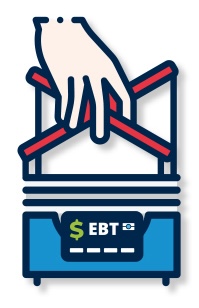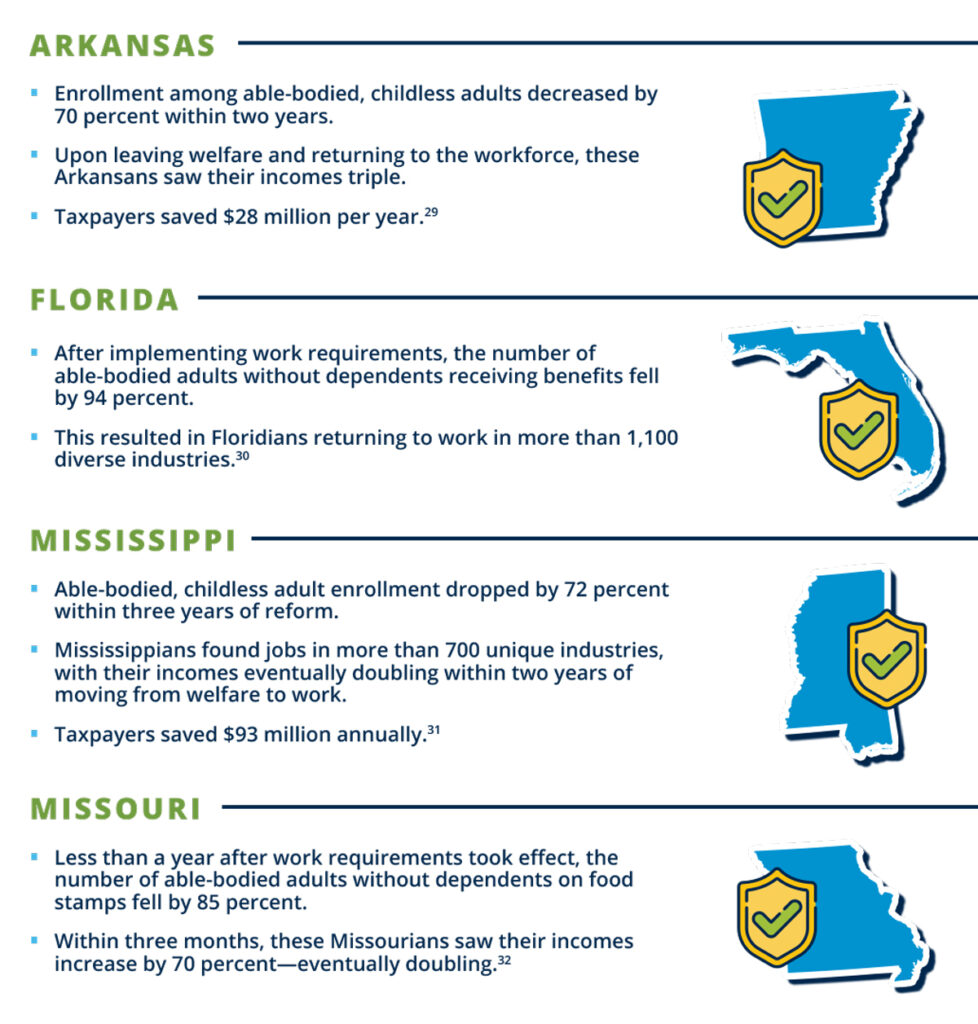The Biden Administration’s New Food Stamp Work Requirement Exemption is Keeping Able-Bodied Adults Trapped in Dependency
Key Findings
- There are millions of open jobs across the country, but most able-bodied, childless adults on welfare are not working at all.
- In 2023, the debt ceiling deal created a new exemption to food stamp work requirements for those who are experiencing homelessness.
- This is the latest in a long line of gimmicks and loopholes aimed at reducing the effectiveness of work requirements.
- This is the latest in a long line of gimmicks and loopholes aimed at reducing the effectiveness of work requirements.
- Work requirements have a proven track record of success.
Overview
Today, there are more than 41 million food stamp enrollees nationwide.1 While there are nearly 10 million open jobs that employers are desperate to fill, enrollment among able-bodied adults without dependents (ABAWDs) remains at near-record-high levels.2-3 Worse yet, most of these able-bodied, childless adults on welfare are not working at all.4
Federal law requires able-bodied adults on food stamps to work, train, or volunteer at least part time.5 But despite federal law mandating work requirements for able-bodied adults, states have a long history of using gimmicks and loopholes to game the system and bypass work requirements.6

Even worse, the recent debt ceiling deal resulted in the latest scheme to exempt as many able-bodied adults from work requirements as possible. The debt ceiling deal created a new exemption to the food stamp work requirement for those experiencing homelessness. To prevent abuse, states should verify claims of homelessness made by enrollees seeking an exemption from the work requirement.
The debt ceiling deal made major policy changes to the food stamp program, exempting those who are experiencing homelessness from the ABAWD work requirement
According to federal law, able-bodied adults on food stamps are subject to work requirements to remain eligible for benefits.7 The general work requirement applies to all work registrants—or able-bodied adults—and the ABAWD work requirement is specifically applied to able-bodied adults without dependents.8

Under the ABAWD work requirement, able-bodied adults must work, train, or volunteer at least part time to qualify for benefits.9 Beginning in October 2023, this work requirement applies to able-bodied adults between the ages of 18 and 52—an increase in maximum age, which was
a result of the debt ceiling negotiations.10-11 By 2025, ABAWDs under 55 will be subject to the work requirement.12
The debt ceiling negotiations paved the way for major policy changes to the food stamp program.13 While there were some positive changes to the food stamp program, these changes were overshadowed by new exemptions to work requirements.
In exchange for a reduction in no-good-cause exemptions for states and expanding the maximum age at which able-bodied adults are subject to work requirements, the debt ceiling deal created a new exemption to the ABAWD work requirement for food stamp enrollees who are experiencing homelessness.14
But the federal definition of “homeless individual” leaves much room for interpretation. For example, a food stamp enrollee may be considered homeless if they are residing in a temporary accommodation for 90 days.15 This could allow couch surfers or even people staying with a family member to be considered homeless.16
Moreover, by allowing self-attestation, anyone may claim to be “homeless,” leaving the door wide open for those who are not homeless to take advantage of this loophole and avoid work requirements altogether. Accepting self-attested information invites fraud and makes it all too easy for people to skirt work requirements.17-18 States should verify with documentary evidence, instead of relying on the enrollee’s attestation.

States have a long history of using loopholes and gimmicks to bypass federal law
For years, states have tried to game the system by using gimmicks and loopholes to allow as many able-bodied adults as possible to avoid work requirements.19 For example, some states gerrymander geographic areas together to make unemployment rates appear higher than they really are so that they may waive work requirements for the maximum number of able-bodied adults.20 States also manipulate old data to gain approval for new work requirement waivers.21
Worse yet, the Obama administration actively pressured states into waiving the work requirement to keep as many able-bodied adults trapped in dependency as possible.22 And the Biden administration is continuing that policy.23

Federal law also allows states to exempt up to eight percent of ABAWDs from work requirements for any reason whatsoever, and any unused exemptions carry over from year to year.24-25 During the public health emergency, states amassed a stockpile of these exemptions while the ABAWD work requirement was suspended.26 This allows states to effectively keep the work requirement suspended, even though the federal suspension has been lifted.27-28
These gimmicks and loopholes are used to exempt as many able-bodied adults from the work requirement as possible. However, work requirements have proven to be an effective tool for breaking the cycle of dependency.
Work requirements have a proven track record of success
Work requirements have long been an effective tool for aiding food stamp enrollees in the transition from welfare to work, and many states have seen great success after implementing them.

Work requirements are a proven tool and can set able-bodied adults on the path toward self-sufficiency. Evidence has shown that transitioning from welfare to work leads to increased incomes, more employment opportunities, and taxpayer savings.33 Unfortunately, this new exemption to work requirements makes it more difficult for those who qualify to get back on their feet and improve their situation.

THE BOTTOM LINE: States should verify claims of homelessness made by those seeking an exemption from food stamp work requirements.
While progress was made on the program integrity front during the debt ceiling negotiations, that progress was stalled by a new exemption to food stamp work requirements. Federal law makes it all too easy for able-bodied adults to claim to be “homeless,” compromising program integrity along the way.
Work requirements work and have a long history of lifting able-bodied adults out of dependency. To combat this new exemption, state lawmakers must take matters into their own hands. By verifying that an applicant has resided in a shelter for at least 30 days, or that the applicant is on a public housing waiting list if no indoor shelter is available, states can ensure that those seeking exemptions are eligible. By verifying claims of homelessness, lawmakers can guarantee that work requirements are impacting as many lives as possible.

References
1 Food and Nutrition Service, “Supplemental Nutrition Assistance Program: Number of persons participating,” U.S. Department of Agriculture (2023), https://fns-prod.azureedge.us/sites/default/files/resource-files/snap-persons-10.pdf.
2 Bureau of Labor Statistics, “Job openings and labor turnover – August 2023,” U.S. Department of Labor (2023), https://www.bls.gov/news.release/jolts.nr0.htm.
3 Jonathan Bain, “Work requirements work: How expanding food stamp work requirements can continue to break the cycle of dependency,” Foundation for Government Accountability (2023), https://thefga.org/research/work-requirements-work-break-cycle-dependency.
4 Ibid.
5 Food and Nutrition Service, “SNAP work requirements,” U.S. Department of Agriculture (2023), https://www.fns.usda.gov/snap/work-requirements.
6 Jonathan Bain and Jonathan Ingram, “Waivers gone wild: Congress must crack down on food stamp loopholes,” Foundation for Government Accountability (2023), https://thefga.org/research/waivers-gone-wild-food-stamp-loopholes.
7 Food and Nutrition Service, “SNAP work requirements,” U.S. Department of Agriculture (2023), https://www.fns.usda.gov/snap/work-requirements.
8 Ibid.
9 Ibid.
10 Ibid.
11 Mary Clare Jalonick et al., “Debt ceiling explained: What to know about the showdown in Washington as default looms,” AP News (2023), https://apnews.com/article/debt-ceiling-biden-mccarthy-default-negotiations-cb0646c6301f1df97211896897df3723.
12 Jonathan Bain, “Work requirements work: How expanding food stamp work requirements can continue to break the cycle of dependency,” Foundation for Government Accountability (2023), https://thefga.org/research/work-requirements-work-break-cycle-dependency.
13 Public law 118-5 (2023), https://www.congress.gov/118/plaws/publ5/PLAW-118publ5.pdf.
14 Ibid.
15 7 USC § 2012.
16 Ibid.
17 Michael Greibrok, “The food stamp program encourages fraud by not acknowledging household realities,” Foundation for Government Accountability (2023), https://thefga.org/research/food-stamp-program-encourages-fraud-household-realities.
18 Hayden Dublois, “Manufacturing a Medicaid crisis: How Ohio mismanaged its way into a disaster,” Foundation for Government Accountability (2023), https://thefga.org/research/ohios-medicaid-program-mismanagement-crisis.
19 Jonathan Bain and Jonathan Ingram, “Waivers gone wild: Congress must crack down on food stamp loopholes,” Foundation for Government Accountability (2023), https://thefga.org/research/waivers-gone-wild-food-stamp-loopholes.
20 Ibid.
21 Ibid.
22 Ibid.
23 Ibid.
24 Public law 118-5 (2023), https://www.congress.gov/118/plaws/publ5/PLAW-118publ5.pdf.
25 Alli Fick and Scott Centorino, “No good cause: How a food stamp loophole could become the next big battle in the war on work,” Foundation for Government Accountability (2022), https://thefga.org/research/food-stamp-loophole-next-big-battle.
26 Ibid.
27 Ibid.
28 Jonathan Bain and Jonathan Ingram, “Waivers gone wild: Congress must crack down on food stamp loopholes,” Foundation for Government Accountability (2023), https://thefga.org/research/waivers-gone-wild-food-stamp-loopholes.
29 Jonathan Ingram and Nic Horton, “Work requirements are working in Arkansas: How commonsense welfare reform is improving Arkansans’ lives,” Foundation for Government Accountability (2019), https://thefga.org/research/work-requirements-arkansas.
30 Jonathan Ingram and Nic Horton, “Commonsense welfare reform has transformed Floridians’ lives,” Foundation for Government Accountability (2019), https://thefga.org/research/commonsense-welfare-reform-has-transformed-floridians-lives.
31 Jonathan Ingram and Nic Horton, “Welfare reform is moving Mississippians back to work,” Foundation for Government Accountability (2019), https://thefga.org/research/mississippi-food-stamps-work-requirement.
32 Hayden Dublois et al., “Food stamp work requirements worked for Missourians,” Foundation for Government Accountability (2020), https://thefga.org/research/missouri-food-stamp-work-requirements.
33 Jonathan Bain, “Work requirements work: How expanding food stamp work requirements can continue to break the cycle of dependency,” Foundation for Government Accountability (2023), https://thefga.org/research/work-requirements-work-break-cycle-dependency.
